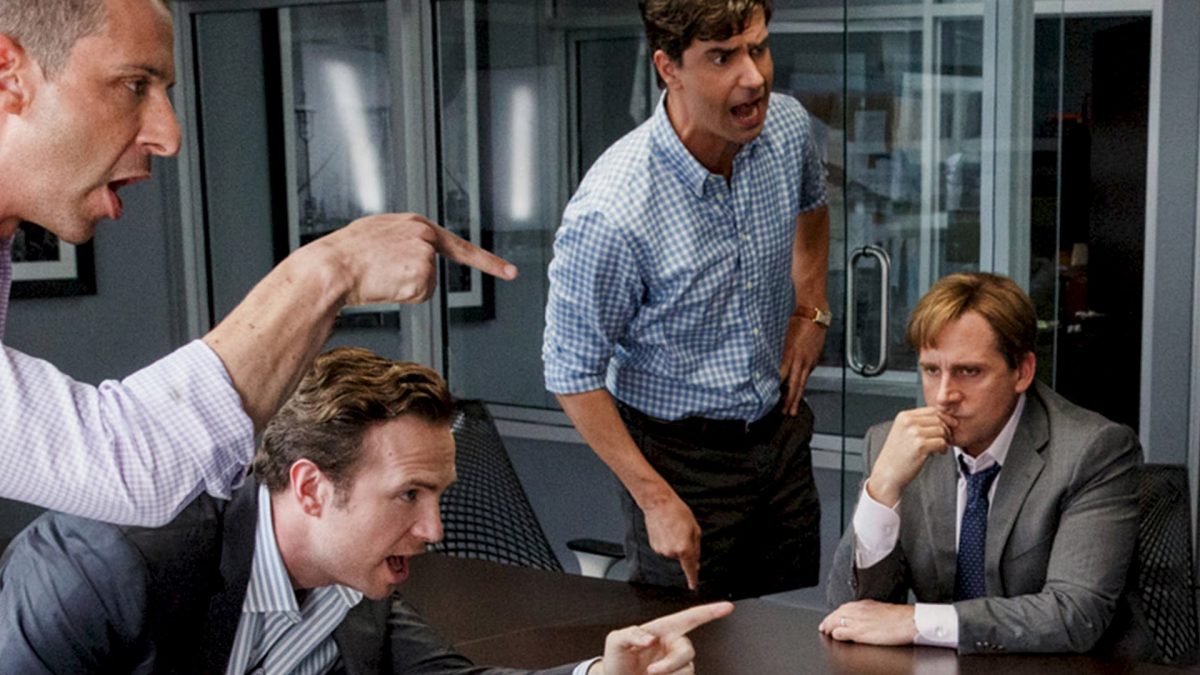 (4.5 / 5)
(4.5 / 5)
You wouldn’t think the recent global financial crisis would be the stuff of comedy, but The Big Short makes it funny – and educational, and genuinely moving.
Directed and co-written by frequent Will Ferrell collaborator Adam McKay (Anchorman, Talladega Nights) and with an all-star cast, including Christian Bale, Steve Carrell, and Ryan Gosling, The Big Short makes for a highly entertaining (and instructive) study of greed, fraud, and three groups of people who sought to profit from the meltdown before it happened.
When hedge fund manager and former medical doctor Michael Burry, Phd. (a yet-again transformed Bale) discovers that America’s booming housing market is built on a bedrock of bad loans, he decides to bet against it through a series of credit default swaps — a whole new type of deal that will compensate him if and when the number of mortgage owners defaulting hits critical mass and the whole thing collapses. Since no one else can foresee that happening, the banks are all-too eager to take his money.
As a result, shark-like investor Jared Vennett (a dark-eyed, oh-so-slick Gosling) can smell money in the water and, seeing a once-in-a-lifetime opportunity get seriously rich, ropes in trader Mark Baum (a fuming Carrell) and his team into putting up the cash. Ignorance may be bliss, but they’re using the knowledge to beat the market while there’s still a market to beat.
From Gosling’s slick opening narration about the birth of modern banking — and frequent breaking of the fourth wall throughout the film’s two-hour-ten-minute run-time (“I never hung out with these guys. I had fashion friends”) to its use of of handy popup definitions for financial jargon and celebrity info-dumps (see: Margot Robbie explaining subprime mortgages from a bubble bath), The Big Short manages to convey the highly convoluted information necessary to tell it story in a form that’s not only bearable but fascinating.
It’s all the more impressive that this mockumentary style doesn’t detract from the drama, but instead serves to heighten it, making it perfectly clear the exact stakes at play.
It takes a guy with a glass eye and a Supercuts haircut to figure out that the bubble — which as Michael’s boss snarkily notes, as a bubble, no one can see — is about to burst. Characterized by distracted mutters and the occasional crooked smile, Michael may be superior and uncommunicative, but he’s also the only one checking the numbers, the only one who sees the situation can’t last.
Nobody that is except Carrell’s Mark.
A cynical man made angry by tragedy, Mark interrupts a support meting to rant about the corruption he sees every day. A rogue element, work at a bank but not for a bank, his team — including comically dour Hamish Linklater, Jeremy Strong, and Rafe Spall as an optimistic foodie — initially think it sounds simultaneously too good to believe and too terrible to comprehend.
Cutaways to clouds moving over Wall Street and shake your money-maker music videos may seem like distractions, but they lend to the air of distraction that suffuses The Big Short. Mark realizes that the world economy might collapse over sushi with a smirking shit in an expensive suit — the red lighting and ambient Sweet Child of Mine only lending to the surreal nightmarishness of the situation. There’s a definite “final days of the Roman Empire” feel to the Securities Forum that takes place at Caesar’s Palace and, for all the technical jargon, the money, it seems, is definitely dumb.
Frat bro mortgage lenders who target cash rich strippers looking to invest in property and leave the income section blank; credit rating agencies scared to refuse to give the bank’s the credit ratings they desire; and finance journalists refusing to support on the situation for fear of what they might lose – the whole system is rigged and the whole things about to come tumbling down.
There are no obvious heroes here. Even the “little guys” — two plucky young investors from Boulder, Jamie (Finn Witrock) and Charlie (John Magaro) — are ultimately out for a buck. The first guys to undercut the AA tranche — don’t worry, this will make a surprising amount of sense — their mentor, retired banker turned self-sufficient farmer farmer Ben Rickert (cameo-ing producer Brad Pitt) solemnly reminds them, it’s ordinary people who will pay the price here. The film offers up the sobering statistic that when employment goes up 1% 40,000 people die.
Making a recce down the Florida, the team find whole upmarket communities abandoned, floors littered with bills; the only ones left behind are those trying to scrape out a living amidst the devastation — like the guy who discovers his landlord is a) defaulting and b) possibly a literal dog.
The Big Short connects abstract financial issues to real lives, real stakes. It’s a very masculine world, one populated by absent husbands and fathers — Marisa Tomei appears briefly as Mark’s wife, Melissa Leo as an (ironically) near-blind ratings agency rep — where everyone knows enough to think they’re smart, to think they’ve got it made, and no one can see that the sky is falling in.
At best willfully naive, worse negligent, or worst outright crooks — encouraging people to buy, buy, buy even as stock goes into free-fall — the film is a desperate plea for intelligence and awareness; that we listen to Chicken Little.
As the maxim says, “The truth is like poetry, and most people fucking hate poetry”; The Big Short simply gives it a rhythm. When it comes to turning a dry, stats-driven narrative into an A-Grade dramedy, this is Moneyball standard stuff.
Btw, if you’re looking for a stock tip, Michael Burry is now investing exclusively in water — and if that doesn’t fill you with fear, you haven’t been paying attention.
